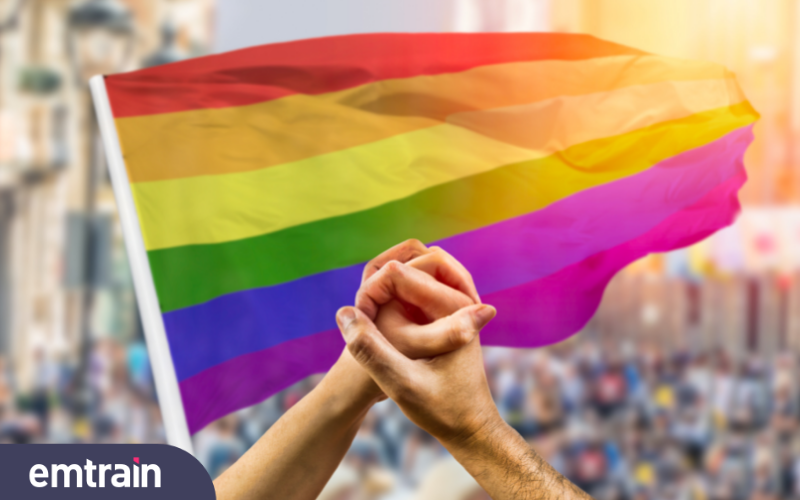At Emtrain, we’ve been hard at work building a framework for measuring and scoring indicators of Inclusion, Respect, and Ethics and providing research and benchmarking to help companies be more intentional in their efforts. As we teach and gather insights, we also collect learner stories, and we’re always touched by the workplace situations they choose to share. Here are some of their experiences, in their own words.
June is the month we celebrate Pride, recognizing the travesties and sacrifices of the LGBTQIA+ community, recognizing LGBTQIA+ rights, and a joyful culture of acceptance. Allies want to support their LGBTQIA+ colleagues, but may not realize their experience in the workplace, and how deeply hurtful stereotypical or hate-filled words and actions can be.
Some employees have generously shared their painful workplace experiences so we can understand the range of mistakes people make and manage through them to build more respectful and inclusive workplaces.
Some people purposefully treat LGBTQIA+ colleagues differently (disrespectfully) at work.
Too many people disrespect and disparage members of the LGBTQIA+ community.
“My old boss – be it unconscious or not – denied me a role based on my sexuality – and made several disparaging remarks and imitations of the gay community.”
“Being a transgender some people can be very discriminatory or judgemental.”
“A transgender employee referred to as “not a real man” by a coworker. Caused conflict and tension between team members. Said coworker was also not held to any accountability even with multiple complaints toward them. Situations such as these make me lose hope that work environments can ever grow to be all inclusive and safe for all its employees.”
“We have had multiple trans employees and I have seen multiple managers/key holders treat them unfairly. Will refuse to use their correct name/pronouns, will voice to other employees they “just don’t get it” and have acted like they were a great employee until they find out their identity and then start acting like they’re not as good anymore. One of the employees has quit.”
“People tend to perceive me as a straight guy when they see me. When they figure out that I’m gay they tone changes, and they start behaving in a different way. I’m not sure how to explain this fully yet, but definitely something that I can notice.”
“Queer people get mixed expectations. Gay & Bi men often find themselves in the same judged categories as women (if you’re assertive, it’s “pushy” or “bitchy”), and then feedback on performance is delivered through that lens.”
With the Supreme Court’s decision on Bostock v. Clayton County, the protections of Title VII of the Civil Rights Act of 1964 were extended to individuals who are discriminated against based on their sexual orientation or gender identity. In other words, LGBTQIA+ rights are now recognized across American workplaces. Spread the word!
- If you are a manager, be sure employees know that harmful words and actions against LGBTQIA+ colleagues will bring disciplinary action and potentially termination.
- If you are a co-worker, protect colleagues by being an upstander. Intervene when you see disrespectful behavior and ask for help from HR.
Some people unintentionally treat LGBTQIA+ colleagues differently at work
Many people also assume that colleagues are straight and cis-gendered. If the organizational culture is not inclusive, LGBTQIA+ colleagues may feel they have to ‘cover’— hide or downplay the core personal characteristic of their sexual or gender identity.
“There’s been countless times that people have asked what kind of men I date, or if I have a boyfriend or married. I’m a lesbian.”
“A coworker has said multiple things indicating her discomfort with women who don’t shave, transgender people who she finds too “flamboyant”, and other microaggressions. She always says this “not in a bad way” but it’s hard not to feel like she wouldn’t see me the same way if she knew I was nonbinary.”
“A customer was not accepted for being a transgender when addressed as “sir” instead of “miss”. It was an accident, but the customer did not return after that.”
- Open your mind to the fluidity of gender and sexual orientation. In a world as diverse and interesting as ours, it does not make sense to have a binary system.
- Get to know each colleague for who they are, without making assumptions about their personal characteristics and life choices. Let people reveal details about themselves— should they wish to—as you build a relationship and establish trust.
Some people haven’t figured out that what they think is funny is actually very offensive
Watching past episodes of TV shows and movies can be cringe-worthy once you’ve become aware of how offensive and derogatory a lot of humor used to be. In many cases, people still think this humor is OK, and in today’s workplace, it clearly is not.
“There was one associate making jokes with a friend, pretending to be a gay couple. They didn’t realize that the new associate that was watching them was homosexual and made the new associate very uncomfortable.”
“We had a maintenance tech who would talk with a “gay lisp” because he thought it was funny to do so in certain situations not realizing he was/could be offending people. We had to sit him down and counsel him on his behavior and explain why it was unacceptable. This was hard on him because of the habits/bias/culture he embraced and eventually left the company.”
- Use Emtrain’s Workplace Color Spectrum which helps employees rate negative behaviors as yellow (demotivating), orange (risky, disrespectful behavior based on protected characteristics), or red (toxic behavior). In the above situations, a person could yell out “orange” to send out a warning that the actions are inappropriate for the workplace.
People are evolving, slowly.
“Some years before the Supreme Court decision on gay marriage, I got into a car with a male coworker who said “my husband has an identical car” – I corrected him before considering that he really did mean his husband.”
- It’s right to have high expectations and demand equal treatment in the workplace. But may need to give some of our colleagues a little grace and space as they understand their misconceptions and misperceptions and evolve their mindset.
For more tools and techniques to teach LGBTQIA+ rights and respect, including our series of Microlessons, contact us!








